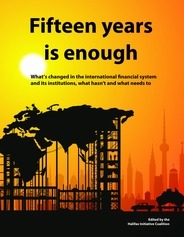Parliamentary Roundtables on the G8/G20 Agendas
2010 is an important and unique moment for Parliamentarians to engage with Canadians on some of the most important global issues facing our planet and our future. On June 25th, 2010, Canada will play host to leaders from the Group of Eight countries in Muskoka, followed by a meeting of G20 leaders in Toronto on June 26-27.
To date, there has been little discussion among parliamentarians about the themes leading up to the 2010 summits, and Canadian civil society is looking to engage members from all parties in a discussion around some of the issues highlighted in our civil society platform, An Agenda for Global Development: G8/G20 Civil Society Coalition Platform, endorsed by over 60 organizations across the country. The platform discusses specific, measurable, realistic recommendations to put poverty eradication, economic recovery for all and environmental justice at the centre of the international agenda.
To facilitate the conversation, Canadian civil society is organizing three parliamentary roundtables to discuss party perspectives on climate change, the financial crisis and the millennium development goals (MDGs). The Roundtables will occur as the G20 Finance Ministers meet in Washington, as G8 Development Ministers meet in Halifax and as Canada hosts the Africa Partnership Forum in Toronto.
Roundtable 1: Climate change
When: Tuesday, April 20th, 2010 - 9:00 am –11:00 am
Where: Room 2-2, Booth Building, 165 Sparks Street, Ottawa
Roundtable 2: Global financial crisis
When: Monday, April 26th, 2010 - 5:00 pm –7:00 pm
Where: Room 2-2, Booth Building, 165 Sparks Street, Ottawa
Roundtable 3: Millennium Development Goals
When: Tuesday, April 27th, 2010 - 9:00am –11:00am
Where: Room 2-2, Booth Building, 165 Sparks Street, Ottawa |
ROUNDTABLE DETAILS
Canadian G8 G20 Civil Society Platform
Roundtable Agendas
Moderator, MP and Expert Bios
Podcasts
|
